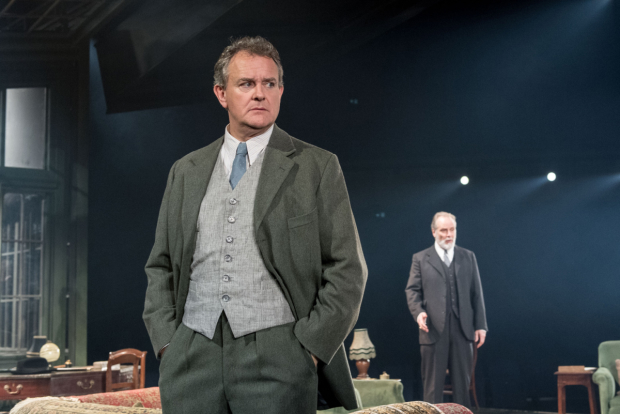An Enemy of the People (Chichester Festival Theatre)
Hugh Bonneville returns to the stage in Ibsen’s drama

© Manuel Harlan
Howard Davies' production of Ibsen’s 1882 play – with Hugh Bonneville as a high-minded whistleblower, determined to get the truth out at any cost – feels timely. But then it’s frequently staged these days because it just keeps on feeling timely. Whether you think of Edward Snowden, Hillsborough, Rotherham, or Fifa, there’s no doubt that money, power and corruption are often what really speak – or rather, what really silence.
Ibsen’s tightly-wound plot follows Dr Stockmann, who reveals that the water supply for his beloved town’s new spa is contaminated and poisoning visitors. Initially the powers that be – the newspaper men, the representatives of small businesses and property owners, gatekeepers of the "solid majority" – hail him and his discovery. Until the corrupt mayor (Stockmann’s brother, no less), representing the interests of the town’s well-to-do elite, points out that the spa is what makes the town prosperous. To re-lay the pipes would be exorbitantly expensive; a cost that would be passed on to the people in taxes, of course.
Stockmann is swiftly turned against, by all-too-believably weasely men in suits and an incensed public. Bonneville, who as Stockmann begins with a sort of genial false modesty, evidently chuffed at so diligently upholding his duty, is convincingly aghast at how he’s attacked and discredited. Still, he holds fast to his morals. Bonneville gives a solid, very human performance, but you identify with his plight, rather than having the sense of watching a towering figure. Stockmann is described in the play as "unruly, pugnacious", but Bonneville’s not much of a firebrand. Still, after 12 years away from the stage, having been busy bounding around with Labradors in Downton Abbey and the like, it’s a welcome return.
He’s also not afraid to take the character in some less pleasant directions: for Ibsen’s play isn’t as simple as ‘honourable man screwed by venal world’. A well-stocked crowd scene sees Stockmann publically smeared; he reacts with an understandably angry invective against the public, but it soon turns nasty, Stockmann accusing them of being stupid and unenlightened. He suggests we should be ruled by superior people, and while the arguments for progressive politics hit home, Bonneville’s delivery makes his character suddenly seem a less than wholly admirable figure: dangerously arrogant, snobbishly elitist.
Ibsen soon turns the screw again: the crowd become stone-throwing thugs, as if to immediately prove Stockmann’s point about the dangers of mob mentality. Again, this feels richly relevant to way the media today whip up fear and loathing, which we can all agree is ‘bad’. Yet to deny the people’s will? Also bad. As Churchill once said, democracy is the worst form of government, except for all those other forms…
Updated to the 1940s, Davies’ production otherwise shows little obvious directorial imprint; the set is realistic, the moral dilemmas clear, the acting mostly good, with Adam James’ smooth newspaper editor and Abigail Cruttenden as Stockmann’s long-suffering (and underwritten) wife especially assured. But it’s a bit staid.
The play may seem to speak to us about our own times, but that’s what the audience brings to it: the production itself fails to really make the case. There’s not quite enough oomph; An Enemy of the People makes a bold argument for being bold, yet this production feels rather well-behaved.
An Enemy of the People is at Chichester Festival Theatre until 21 May.












